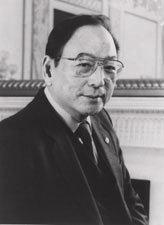Spark Matsunaga
| Spark Matsunaga | |
|---|---|
 |
|
|
United States Senator from Hawaii |
|
|
In office January 3, 1977 – April 15, 1990 |
|
| Preceded by | Hiram Fong |
| Succeeded by | Daniel Akaka |
| Member of the U.S. House of Representatives from Hawaii's 1st district |
|
|
In office January 3, 1971 – January 3, 1977 |
|
| Preceded by | Constituency established |
| Succeeded by | Cec Heftel |
| Member of the U.S. House of Representatives from Hawaii's At-large district |
|
|
In office January 3, 1963 – January 3, 1971 |
|
| Preceded by | Constituency established |
| Succeeded by | Constituency abolished |
| Personal details | |
| Born |
Spark Masayuki Matsunaga October 8, 1916 Kukuiula, Territory of Hawaii, U.S. |
| Died | April 15, 1990 (aged 73) Toronto, Ontario, Canada |
| Political party | Democratic |
| Spouse(s) | Helene Matsunaga (1951–1990) |
| Children | 5 |
| Alma mater |
University of Hawaii, Manoa Harvard University |
| Religion | Roman Catholicism |
| Military service | |
| Allegiance |
|
| Service/branch |
|
| Years of service | 1941–1945 |
| Rank |
|
| Unit |
442nd Regimental Combat Team 100th Infantry Battalion |
| Battles/wars | World War II |
Spark Masayuki Matsunaga (Japanese: 松永正幸, Matsunaga Masayuki; October 8, 1916 – April 15, 1990) was a United States Senator from Hawaii, serving from 1977 until his death in 1990. He was an American Democrat whose legislation in the United States Senate led to the creation of the Commission on Wartime Relocation and Internment of Civilians and The United States Institute of Peace.
Matsunaga grew up on the Hawaiian island of Kaua'i and graduated from Kauai High School. He attended the University of Hawai'i and received his bachelor's degree in 1941. He became a United States Army Reservist in 1941, volunteered for active duty in July that year, and was twice wounded in battle while serving with the renowned 442nd Regimental Combat Team and the 100th Infantry Battalion. After his release from the Army as a Captain, Matsunaga entered Harvard Law School, graduating in 1951. He served as a public prosecutor and private-practice attorney, and was a member of both the Hawaiian statehood delegation to Congress and the territorial legislature. After Daniel Inouye was elected to the Senate, Matsunaga succeeded him as the state's sole member of the House of Representatives. After Hawaii was split into districts for the 1970 elections, Matsunaga was elected for Hawaii's 1st congressional district, comprising Honolulu's inner ring, and held that seat until 1976. That year, with Hiram Fong retiring, Matsunaga defeated Hawaii's other House representative, Patsy Mink for the Democratic Party nomination for Senator. Matsunaga went on to serve in the United States Senate from 1977 until his death in 1990.
...
Wikipedia
